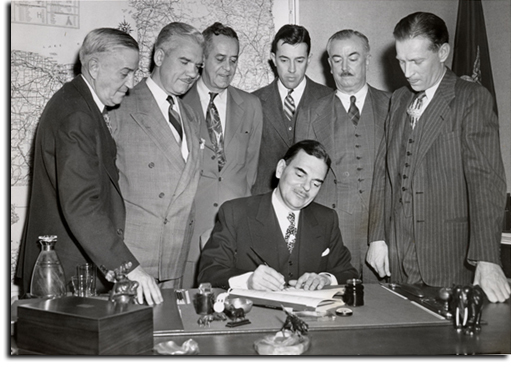Frank C. Moore Papers
by - November 25, 2009
The Department of Special Collections announces the completion of the online finding aid for the Frank Moore Papers.
 New York State Governor Thomas E. Dewey signs the 1950 Thruway Authority Act creating the New York State Thruway Authority (NYSTA), an independent public corporation, which would build and manage the turnpike. (Moore is second from the right).
New York State Governor Thomas E. Dewey signs the 1950 Thruway Authority Act creating the New York State Thruway Authority (NYSTA), an independent public corporation, which would build and manage the turnpike. (Moore is second from the right).
Frank Moore, a New York State politician and civil servant, held a wide range of elected and appointed positions during his fifty-year career. The collection consists primarily of the records of Moore's service in various elected and appointed positions. Materials include correspondence, memoranda, draft and final reports, research material, periodicals, photographs, meeting minutes and news clippings. Many series contain extensive files of internal research and reports that document the statistical information which guided the decision-making of Moore and his colleagues during Moore’s long career as a public servant.
After his admission to the bar in 1924, Moore established a practice in Kenmore and became counsel to the town, village and school district of that name, beginning his lifelong engagement with the problems of municipal organization in New York State. From 1927 to 1932 he served as counsel to the New York State Joint Legislative Committee on the Revision of the Town Law and was one of the principal authors of the final revision enacted in 1932. In 1933, Moore helped establish the New York State Association of Towns and became its executive secretary. And in 1938 he served as a delegate to the State Constitutional Convention.
In 1942, Moore was elected New York State Comptroller and in 1950 he ran for Lieutenant Governor as part of incumbent Governor Thomas Dewey's slate of Republican candidates. He was elected to the position and served until 1953. In 1953 he resigned from the position to take up the chairmanship of the Government Affairs Foundation, a foundation established by Nelson Rockefeller. He would hold this position for the next fifteen years until the dissolution of the Foundation in 1968. Concurrently with his service at the Foundation, Moore served as Chairman, SUNY Board of Trustees and chaired or served on a wide range of commissions, conferences and committees in New York State and in the United States. Moore holds the distinction of being one of two people to serve as a delegate to the New York State Constitutional Conventions of both 1938 and 1967. Moore gradually retired from public service in the late 1960s for reasons of health. Moore died in 1978 in Crystal River, Florida.
</img>